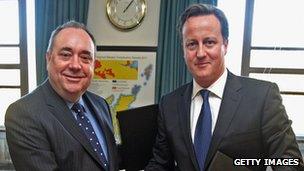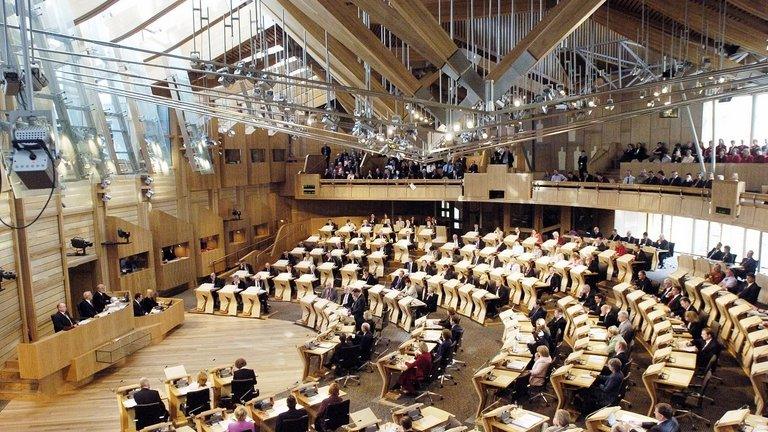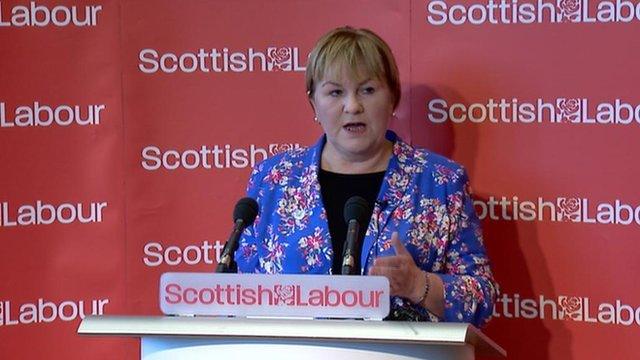Independence referendum: triumphalism deferred
- Published

Both Mr Salmond and Mr Cameron have reason to be pleased with the agreement
As he briefed the media about today's agreement, Alex Salmond confided that he had been told by his advisers: do not look triumphalist.
Plainly, they know their man. Mr Salmond is occasionally given to displaying a sense of internal satisfaction. And so it was with full mock seriousness that the first minister said he always listened to his advisers.
And, on the challenge of triumphalism, he succeeded - mostly. Partly, that was sensible politics - the public dislike bombast. But equally Mr Salmond has not got all he wanted. He would have preferred to retain the option of including a second question on enhanced powers within devolution.
David Cameron ruled that out - and had the leverage to insist. The UK government is lending Holyrood the power to hold a referendum.
But Mr Cameron has also made concessions. The polling date of autumn 2014 fits SNP plans: they want time to convince the Scottish people. The deal also allows the Scottish government to extend the referendum franchise to 16 and 17 year olds.
Basic question
The prime minister decided from the outset that he had to work with the Scottish democratic mandate won by Mr Salmond. Any blocking tactics simply risked building further popular support for the SNP.
Crucially, the agreement commits both governments to working with the outcome of the referendum - whatever that is. That makes it politically binding.
Plainly, there are difficult days to come - not least the small matter of convincing the Scottish people in either direction.
There will be debate over the question to be asked. The Scottish government will be given the power - and will presumably advance their basic question, asking people whether they agree that Scotland should be independent.
The Electoral Commission will advise on whether that is comprehensible and fair, having conducted a study. It will then be up to MSPs whether to accept that advice in the Referendum Bill which will go through Holyrood from the spring.
There will be discussion too over campaign finance. Again, the Electoral Commission will play a key role.
But there is a discernible momentum about the referendum process, advanced substantially today.
We do not know how the Scottish people will vote in the referendum in two years' time.
However, we can be pretty sure - and polling evidence appears to confirm this - that they want to be consulted. They want it to be their decision. They favour a referendum.
Legally watertight
Hence David Cameron's calculation that any obfuscation by his government would be counter-productive.
Hence Alex Salmond's calculation that the prize of a legally watertight referendum - with other concessions - outweighs his notion that Holyrood should decide on whether there should be a second question on devo max or plus.
And so these process discussions have resulted in agreement. Nationalists will be (almost entirely) content that they have their referendum, their clear chance to convince the people of Scotland. For that, they will thank Alex Salmond - plus Nicola Sturgeon (and before her, Bruce Crawford) who brokered the deal.
Unionists will be (mostly) content that they have confined the decision to a straightforward choice on independence: one which they believe they can win.
For that, they will (mostly) thank the prime minister, as well as David Mundell - and Michael Moore, the Liberal Democrat Scottish Secretary who has perhaps enhanced his status in the UK government by sticking to the task which he set himself back in January: to deliver a single question referendum.
As to outcome, the prime minister's calculation is that, given a clear, straightforward choice, the people of Scotland will stick with the Union. Mr Salmond takes precisely the opposite view. For both sides, triumphalism deferred.
- Published4 October 2012

- Published2 October 2012
